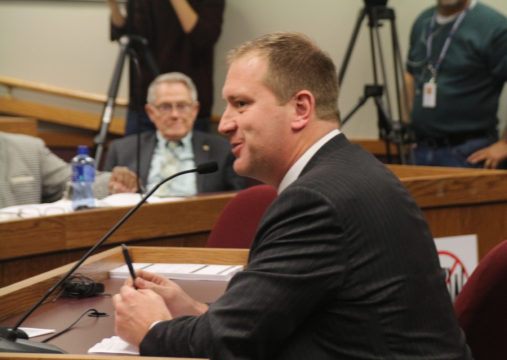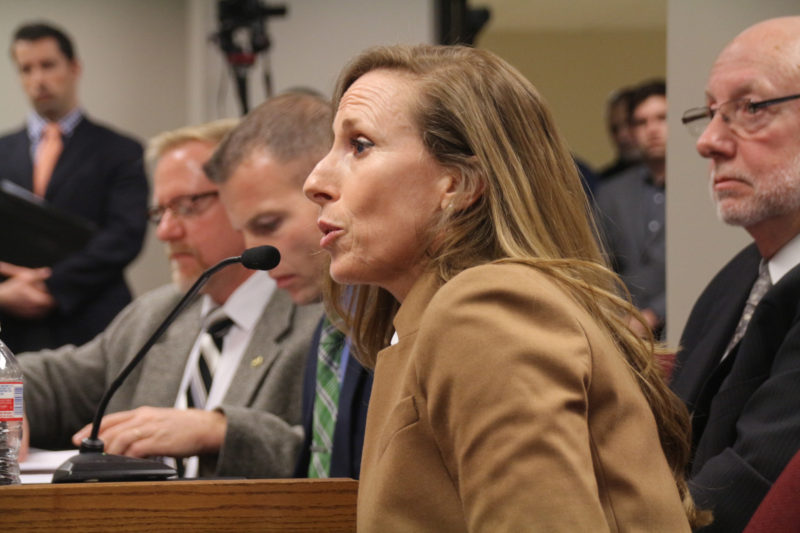JEFFERSON CITY, Mo. – Former Rep. Shannon Cooper, reprentative for the Carpenters District Council may have put it best Tuesday afternoon when he said he felt like Mel Gibson’s portrayal of William Wallace at the end of Braveheart.
“We fought a good fight, but we know where we’re heading,” the union representative said during the House Economic Development Committee hearing on right-to-work legislation.
The three-and-a-half-hour long hearing was a formality – painful for the dozens of union members that crammed into the committee room and a hurdle in the way towards the inevitability that, short of a cataclysmic event, Missouri will become a right-to-work state in 2017.
Rep. Holly Rehder, R-Sikeston, chairs the Economic Development Committee, and she has served as the lead sponsor of labor reform legislation since 2015, authoring 2015’s right-to-work bill as well as 2016’s “paycheck protection” bill. She also authored this year’s version of the bill, HB 91, though Reps. Bill White, Rick Brattin, Bill Lant and Charlie Davis also offered near identical versions. All gave their testimony concurrently before members of the public had the opportunity to testify.
Rehder tried to assuage concerns the law would damage unions by saying right-to-work legislation simply affords employees a chance to ensure their unions would work for them.
“Workers who believe their unions are the best avenue to bargain will have no objection to pay their dues, but workers who do not believe their union is helping them can opt out,” she said.
However, for Cooper and other union members, Missouri’s status as the next and 28th right-to-work states equates to a government intervention that neuters the power of labor unions to represent their workers and provide benefits like higher wages, strong benefits, and increased worker safety for its members.
“In my opinion, this is nothing but government overreach,” Mike Louis, the president of the Missouri AFL-CIO said. “Employers and their employees have a right to negotiate a union security clause in their contract… If they want to organize, they should be able to do so without your interference.”

However, those in support of right-to-work stressed its necessity to save the state in the face of economic distress. State Treasurer Eric Schmitt stopped by the hearing to testify right-to-work would greatly improve Missouri’s economic standing, especially when it comes to competing for businesses to invest their resources in the state of Missouri, generating jobs and employing Missourians.
Schmitt even believes it is essential just to keep people in the state.
“We used to have 13 congressional districts when this debate first began. Now, we have eight,” Schmitt said. “We need to do everything we need to do to put Missouri on a sound financial footing. We are in a very fierce competition with other states for jobs. We have to use every tool in the arsenal.”
Right-to-work supporters joined Schmitt in saying the policy would give Missouri a chance to compete with surrounding states. Most of the representatives who filed the five bills come from southern parts of the state. Rehder is from Sikeston near the Arkansas and Tennessee borders and White, Lant and Davis are from the Joplin area (the bills will likely be rolled into one).
“I fight with Kansas, Oklahoma and Arkansas for business to come to our town,” White said.
Lant noted that businesses that had collectively employed thousands of people in his district had left for greener pastures in right-to-work states.
The fear of losing out contributes to the urgency Republican leadership has attempted to pass the proposal. The bill was one of the first heard in committee for the 2017 legislative session, in large part to Speaker Todd Richardson’s commitment to “bold” reform he promised in his opening remarks last week.
Rehder noted she and the Speaker would work to get Right-to-Work through the House “as fast as the legislative process will allow.”








